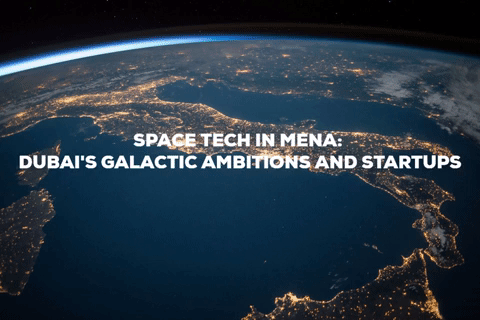The United Arab Emirates (UAE) has been on a mission to secure a prominent position in the global Space Race, and it’s making waves in various sectors of the space industry. From satellite communications to space exploration and cutting-edge SpaceTech innovations, the UAE’s strategic approach is propelling it towards leadership in the space domain.
Strategic Assets and Positioning
The UAE’s commitment to space endeavors encompasses various facets, including space exploration, satellite communications, and the applications of space technology here on Earth. These endeavors span from supporting the United Nations Sustainable Development Goals (SDGs) to advancing global connectivity, responsible business practices, and global security.
One critical element of the UAE’s strategy is its pursuit of leadership in remote sensing through satellites. This capability facilitates climate monitoring, natural resource mapping, and land-use planning, among other applications. To further bolster its position, the UAE is now considering the establishment of a SpaceTech fund and accelerator, poised to propel innovation to new heights.
Pioneering Initiatives
Understanding the UAE’s competitive standing and strategic objectives in space and SpaceTech requires a closer look at some of its most prominent initiatives:
- UAE Space Law: The UAE Space Law aims to create a conducive regulatory environment for activities conducted within the National Space Policy, stimulating investments, encouraging private-sector participation, and implementing environmental measures for space activities.
- UAE National Space Programme: This program is dedicated to training Emirati experts in aerospace sciences, supporting the country’s Space Programme, and overseeing initiatives like the Arab Space Discovery Programme, designed to transfer knowledge and expertise in space sciences.
- UAE Astronaut Programme: Focusing on astronaut training, this program prepares the UAE’s next generation of space explorers.
- Mohammed Bin Rashid Space Centre: This center has launched advanced remote-sensing observation satellites, including DubaiSat 1, DubaiSat 2, and KhalifaSat, elevating the UAE’s capabilities in remote sensing.
- Mars Mission: The UAE continues its exploration of the Martian surface, making history as the first Arab and Islamic country to do so.
- Emirates Lunar Mission: This mission aims to study various aspects of the lunar surface, contributing to lunar exploration.
- Yahsat: As the UAE’s first nationally owned satellite operator and one of the world’s top 10 satellite operators by revenue, Yahsat recently secured $1.2 billion in commitments to finance the Middle East’s first hybrid satellite communications system.

Private Sector’s Vital Role
In tandem with government efforts, the private sector plays a pivotal role in the UAE’s space strategy. Encouraging corporate contributions to SpaceTech can significantly boost the country’s space economy, mirroring the approach taken by the United States.
This approach is already gaining momentum, with SpaceTech companies being selected as part of Abu Dhabi’s global tech ecosystem, Hub71. The Mohammed Bin Rashid Space Centre (MBRSC) has also initiated Space Ventures to support local start-ups, while the UAE Space Agency has formulated a national plan to promote space investment. These collective efforts are propelling the UAE’s space journey forward, emphasizing the significance of private-sector participation.
The Imperative for SpaceTech Investment
To fully realize its space ambitions and establish itself as a SpaceTech leader, the UAE must continue investing in innovation, resources, and technology. A dedicated SpaceTech venture capital (VC) fund and accelerator are indispensable for attracting companies capable of supporting the UAE’s space aspirations, both in the cosmos and on Earth.
A SpaceTech fund and accelerator have several critical functions:
- Technology Advancement: These entities can drive the development of technologies that reduce barriers to space exploration, lower costs, and attract new capital.
- Investment Opportunities: They can identify emerging SpaceTech investment opportunities, bridging the funding gap in space commercialization.
- Talent Development: By nurturing dedicated teams with hands-on expertise, they can identify and pursue the most promising investment prospects.
- Community Building: They can foster a vibrant SpaceTech community within the UAE, encouraging collaboration and knowledge sharing.
Middle East: Ready for Liftoff in the Global Space Industry?
The Middle East is positioning itself as a serious contender in the global space industry. Approximately nine countries in the region now have their space programs, encompassing satellite launches and even lunar landing aspirations.
Though challenges persist, such as the recent lunar landing setback experienced by the UAE, this does not deter the region’s space ambitions. The UAE’s resilience was evident as they swiftly announced plans for a second lunar landing attempt, led by the Mohammed bin Rashid Space Centre.
This setback serves as a reminder that space exploration is fraught with challenges, but it also underscores the UAE’s unwavering commitment to pushing boundaries in the space domain.

A Multifaceted Space Odyssey
The UAE’s space odyssey doesn’t end with lunar landings; it’s merely the beginning. The country has its sights set on establishing the first human settlement on Mars by 2117. Moreover, the Mars Hope mission, orbiting Mars for almost two years now, showcases the UAE’s prowess in planetary science and technology.
Space: The Catalyst for Scientific and Economic Growth
The UAE’s investments in space technology are not just about reaching for the stars; they are about transforming its science and technology industries. Moreover, they provide a blueprint for other countries in the region to follow. For instance, Saudi Arabia has announced its plans to send astronauts to the International Space Station, forming part of a broader collaboration with Axiom Space.
Space exploration is driving innovation and creating jobs, leading to knowledge transfer and economic growth across various sectors. This impact goes beyond commercial revenues, influencing agriculture, transportation, and environmental sectors.
A Region Poised for Global Space Leadership
The Middle East is no longer a bystander but a key player in the global space sector. Collaborations with international partners, including NASA and European space agencies, are paving the way for ambitious endeavors such as lunar rovers and moonwalks.
As space technology becomes increasingly accessible, the region’s space programs have the potential to become significant contributors to the global space economy, which is currently estimated at around $469 billion and continues to grow.
The UAE and Saudi Arabia, in particular, are poised to shape the future of the space industry, ushering in a new era of scientific research, economic growth, and innovation.
In conclusion, the UAE’s ascent in the global Space Race is a testament to the country’s ambition, resilience, and commitment to space exploration. While challenges are inevitable, the UAE’s unwavering determination and strategic investments signal a promising future for the nation as a SpaceTech leader and a catalyst for scientific and economic growth in the Middle East and beyond.
Are you ready to join the UAE in shaping the future of space technology and exploration? The next frontier awaits, and your contribution could be the key to unlocking the mysteries of the cosmos. Join us on this incredible journey towards the stars!
